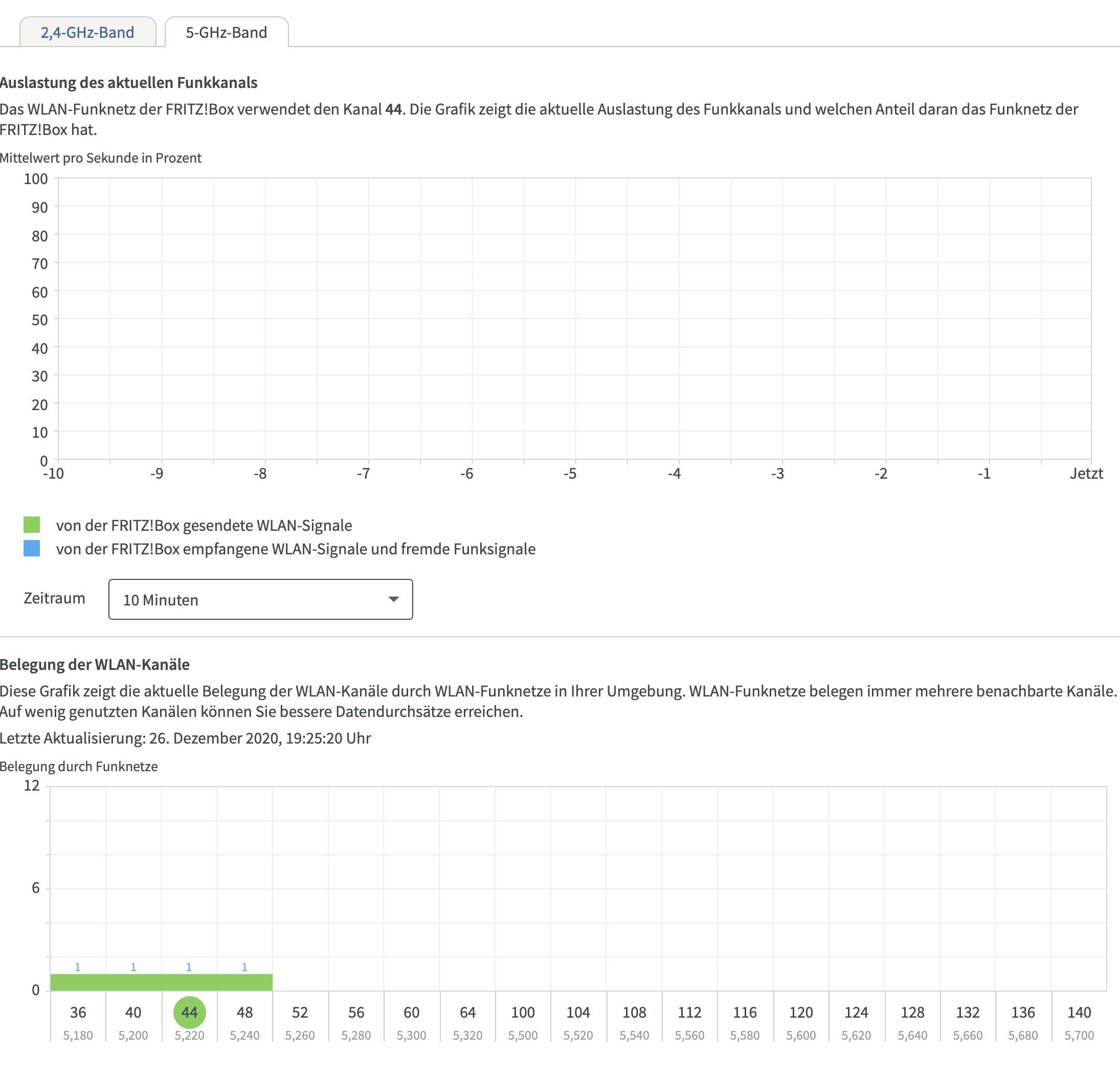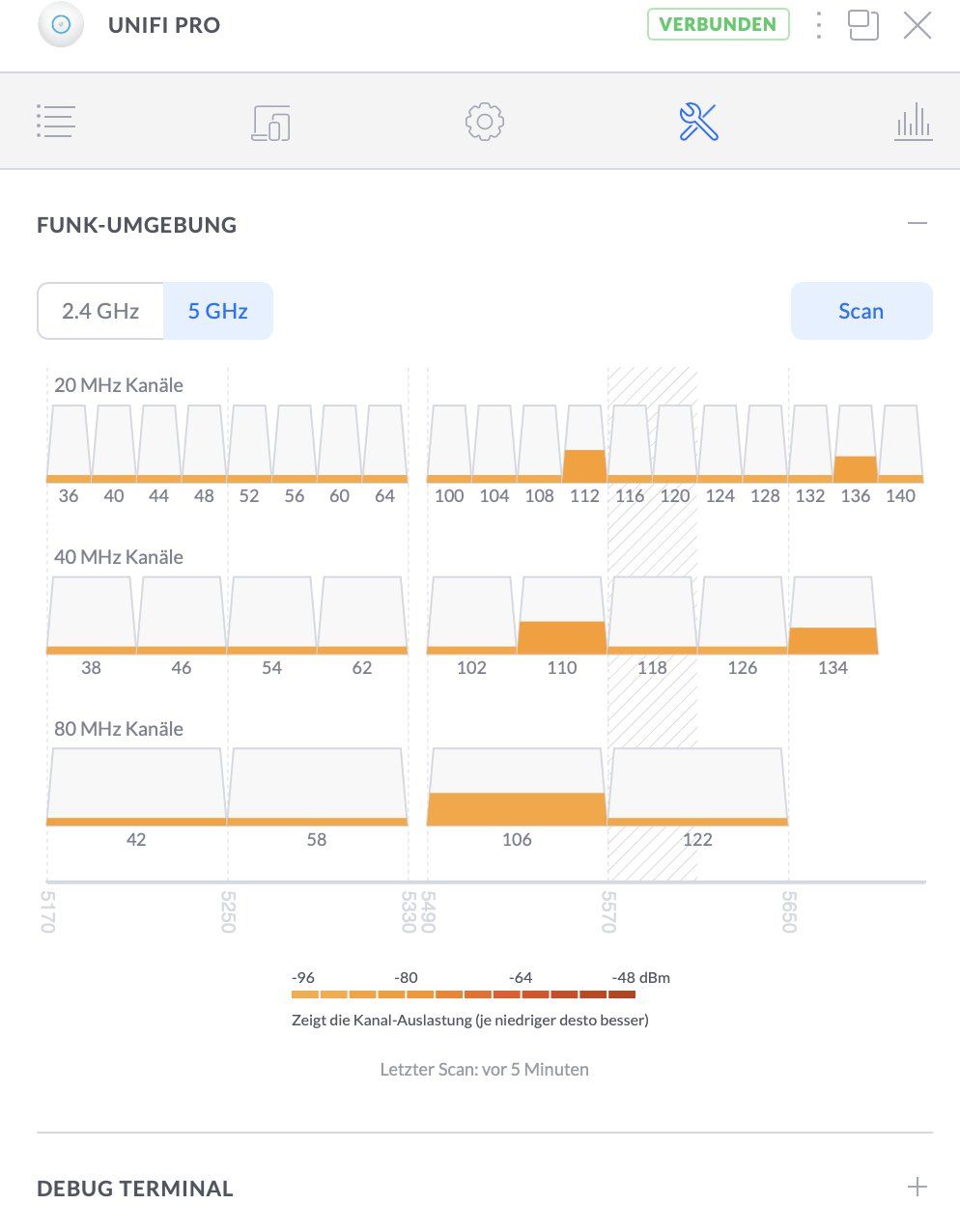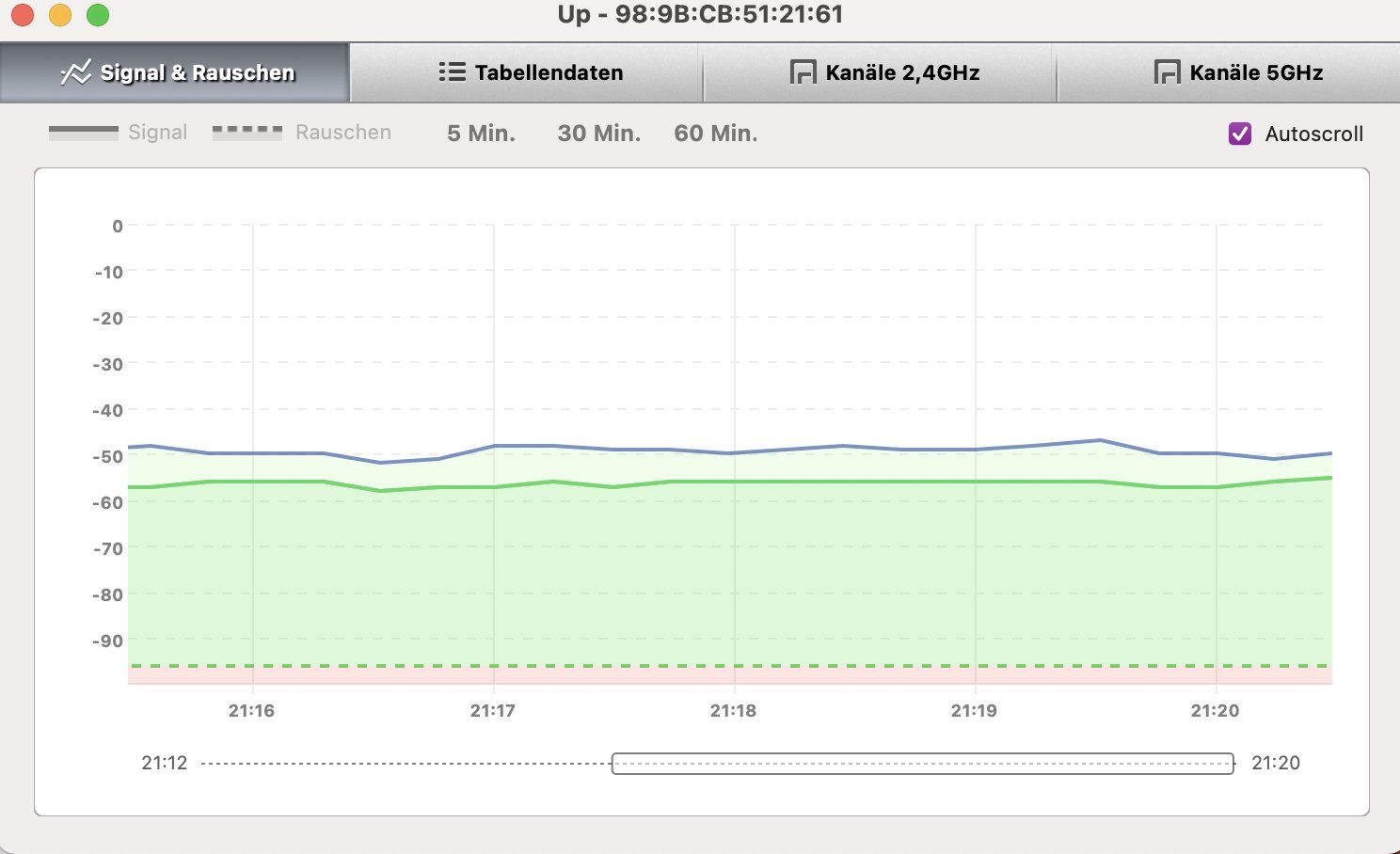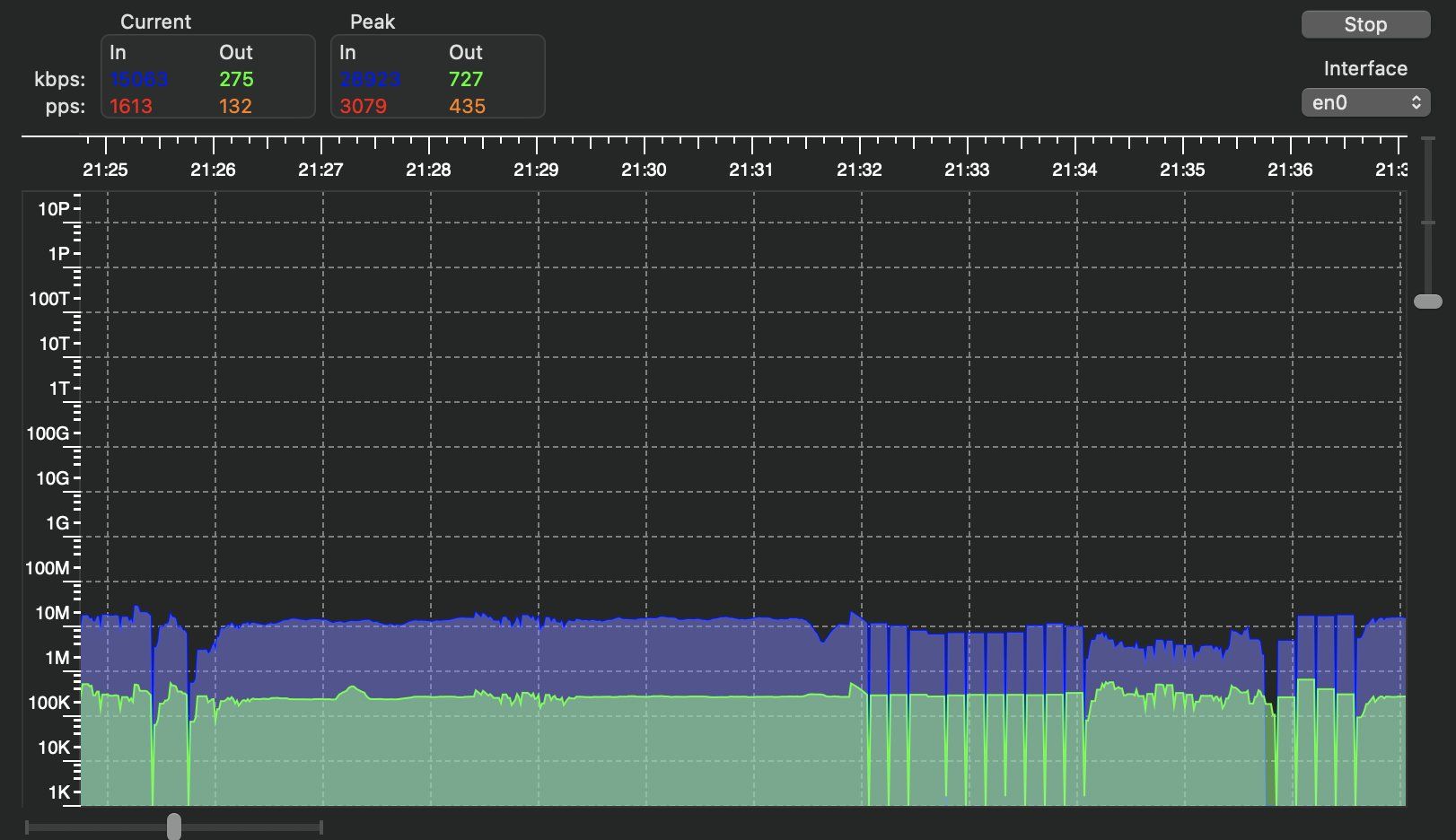Ping"ausrutscher"
Hallo mal wieder in die Runde,
Problem vorab:
Die Pingzeiten variieren "rhythmisch" um Faktor 100.
Situation:
Im "Prinzip" war alles fein und lief auch. Fritze 7520/30 an o2-DSL 50/10. Wifi manuell konfiguriert, wenig Nachbarnetze (DG, drunterliegendes Geschoss leer). Distanz ca. 4 m aus nem Pressspan-Kastl ohne Zwischenwand. Weniger als 10 Clients mit iOS, Windows, MacOS ohne Problemen mit Audiostreams, Videostreams, usw. ... "gehte".
Im Zuge von Coronitis habe ich mich vor ner Woche bei GEFORCE NOW angemeldet.
Während des Spielbetriebs kommt es aber immer wieder zu "Aussetzer" (und auch Warnmeldung, wegen fehlender "Netzwerkqualität"). Also mal nen Ping auf die Fritze und die DSL-Auslastung der Fritze nebenher getrackt. DSL-Auslastung down max. 25 Mbit/s. Pingzeiten ca. 1,5 ms mit periodischen Ausrutschern (ca. alle 20 Pings) auf teilw. über 100 ms. Die Ausrutscher harmonierten auch zeitlich mit den Problemen im Spiel.
Modifikationen/Versuche:
2,5 und 5 Ghz per SSID-getrennt um "die Last der Endgeräte" besser zu verteilen > keine Veränderung;
5 Ghz mit Unifi-AC-Pro aufgespannt. Hier dann Pings mit min. 20 ms und max. knapp 200 ms
Fritzbox-Interne QoS-"Spielereien"
Und natürlich habe ich auch LAN versucht: Hier bleiben fast alle Pings unter 1 ms und der Spielbetrieb ist problemlos.
Den gleichen Spaß habe ich hier testweise im Büro an einer 7490 ebenso sehen können. Hier springt im LAN die Ping-Zeit von knapp 1 ms unter "Stress" (d.h. hier ein iperf3-Test) auf rund 4 ms.
Unter Wifi sieht das sogar folgendermaßen aus:
Erst ohne Ping ....
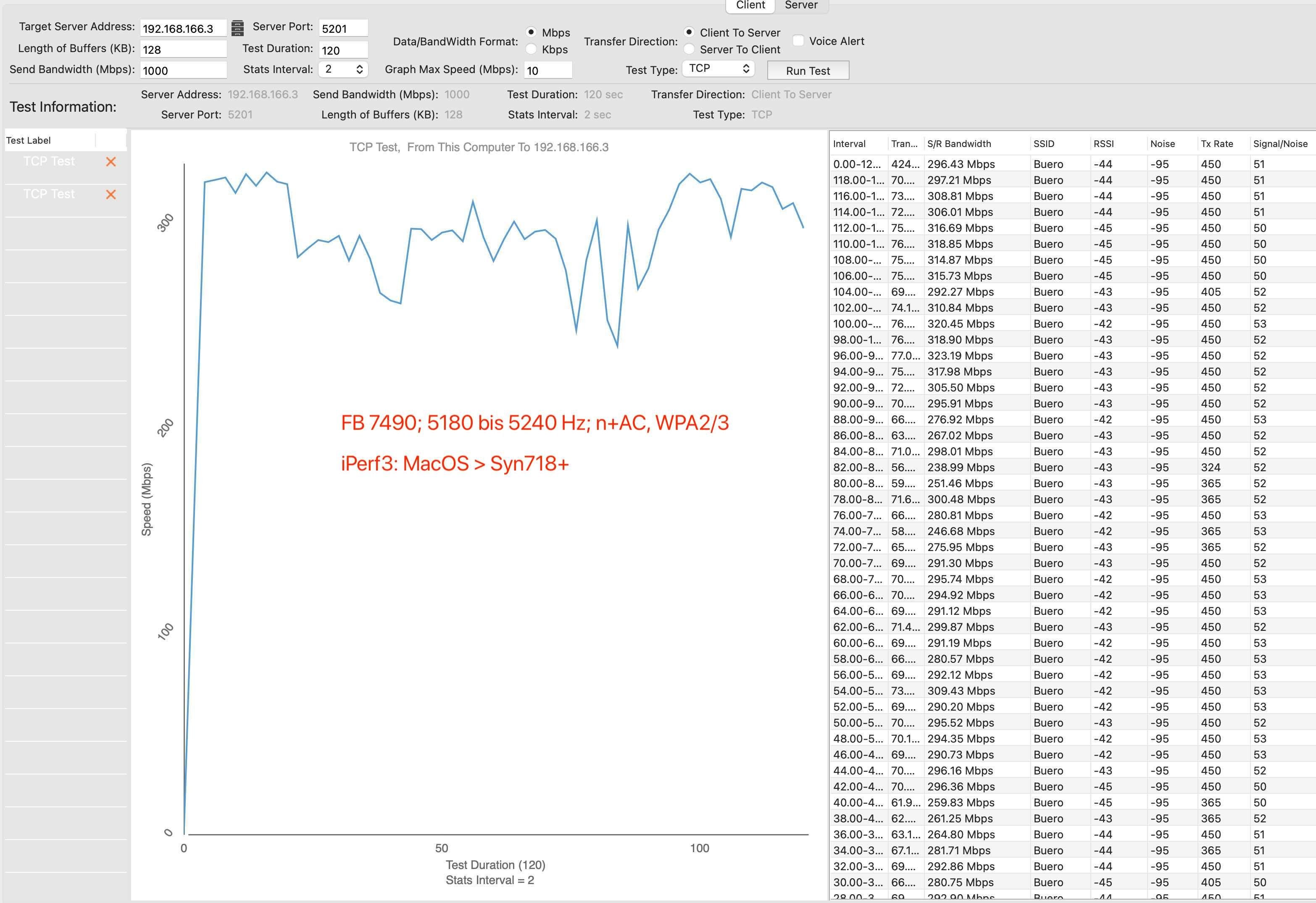
Hier jetzt mit Ping ...
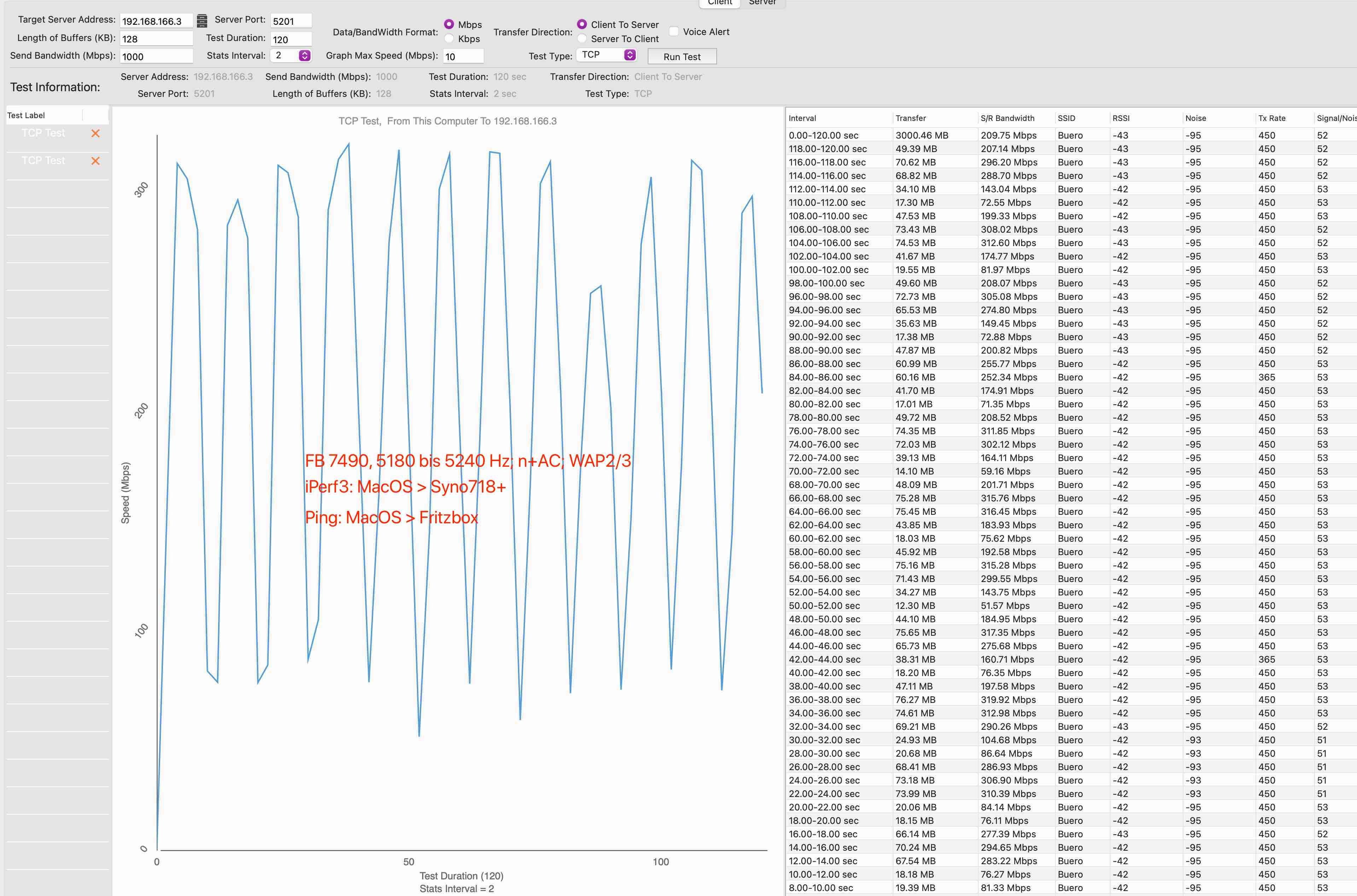
Und hier die parallelen Pings:
Sind diese Werte normal in einem "Heimnetz" oder Folgen einer Fehlkonfiguration?!
Ist das ggfs. der "lütten" Fritzbox-HW geschuldet?
Mir ist klar, dass ein extra AP einen Hopp mehr bedeutet ... aber Faktor 10 bei den ms?
Sieht für mich irgendwie so aus, als wenn irgendwas im Router alle 20 Pings "überläuft".
Sorry für diese "Freitags-Frage" ... aber zwischen den Feiertagen im Corona-Jahr ist doch irgendwie jeden Tag "Freitag". Ich teste sowas eigentlich erst, wenns – nicht – läuft
PS: "gehte" ... heißt eigentlich "f-u-n-z-t-e". Die "Foren-AI" scheint das aber nicht anzuerkennen
Problem vorab:
Die Pingzeiten variieren "rhythmisch" um Faktor 100.
Situation:
Im "Prinzip" war alles fein und lief auch. Fritze 7520/30 an o2-DSL 50/10. Wifi manuell konfiguriert, wenig Nachbarnetze (DG, drunterliegendes Geschoss leer). Distanz ca. 4 m aus nem Pressspan-Kastl ohne Zwischenwand. Weniger als 10 Clients mit iOS, Windows, MacOS ohne Problemen mit Audiostreams, Videostreams, usw. ... "gehte".
Im Zuge von Coronitis habe ich mich vor ner Woche bei GEFORCE NOW angemeldet.
Während des Spielbetriebs kommt es aber immer wieder zu "Aussetzer" (und auch Warnmeldung, wegen fehlender "Netzwerkqualität"). Also mal nen Ping auf die Fritze und die DSL-Auslastung der Fritze nebenher getrackt. DSL-Auslastung down max. 25 Mbit/s. Pingzeiten ca. 1,5 ms mit periodischen Ausrutschern (ca. alle 20 Pings) auf teilw. über 100 ms. Die Ausrutscher harmonierten auch zeitlich mit den Problemen im Spiel.
Modifikationen/Versuche:
2,5 und 5 Ghz per SSID-getrennt um "die Last der Endgeräte" besser zu verteilen > keine Veränderung;
5 Ghz mit Unifi-AC-Pro aufgespannt. Hier dann Pings mit min. 20 ms und max. knapp 200 ms
Fritzbox-Interne QoS-"Spielereien"
Und natürlich habe ich auch LAN versucht: Hier bleiben fast alle Pings unter 1 ms und der Spielbetrieb ist problemlos.
Den gleichen Spaß habe ich hier testweise im Büro an einer 7490 ebenso sehen können. Hier springt im LAN die Ping-Zeit von knapp 1 ms unter "Stress" (d.h. hier ein iperf3-Test) auf rund 4 ms.
Unter Wifi sieht das sogar folgendermaßen aus:
Erst ohne Ping ....

Hier jetzt mit Ping ...

Und hier die parallelen Pings:
ro ~ % ping 192.168.166.1
PING 192.168.166.1 (192.168.166.1): 56 data bytes
64 bytes from 192.168.166.1: icmp_seq=0 ttl=64 time=3.712 ms
64 bytes from 192.168.166.1: icmp_seq=1 ttl=64 time=2.199 ms
64 bytes from 192.168.166.1: icmp_seq=2 ttl=64 time=2.206 ms
64 bytes from 192.168.166.1: icmp_seq=3 ttl=64 time=2.189 ms
64 bytes from 192.168.166.1: icmp_seq=4 ttl=64 time=2.241 ms
64 bytes from 192.168.166.1: icmp_seq=5 ttl=64 time=2.115 ms
64 bytes from 192.168.166.1: icmp_seq=6 ttl=64 time=2.106 ms
64 bytes from 192.168.166.1: icmp_seq=7 ttl=64 time=55.096 ms
64 bytes from 192.168.166.1: icmp_seq=8 ttl=64 time=113.078 ms
64 bytes from 192.168.166.1: icmp_seq=9 ttl=64 time=98.490 ms
64 bytes from 192.168.166.1: icmp_seq=10 ttl=64 time=80.460 ms
64 bytes from 192.168.166.1: icmp_seq=11 ttl=64 time=2.116 ms
64 bytes from 192.168.166.1: icmp_seq=12 ttl=64 time=2.200 ms
64 bytes from 192.168.166.1: icmp_seq=13 ttl=64 time=2.181 ms
64 bytes from 192.168.166.1: icmp_seq=14 ttl=64 time=2.173 ms
64 bytes from 192.168.166.1: icmp_seq=15 ttl=64 time=2.192 ms
64 bytes from 192.168.166.1: icmp_seq=16 ttl=64 time=2.180 ms
64 bytes from 192.168.166.1: icmp_seq=17 ttl=64 time=1.342 ms
64 bytes from 192.168.166.1: icmp_seq=18 ttl=64 time=16.298 ms
64 bytes from 192.168.166.1: icmp_seq=19 ttl=64 time=40.534 ms
64 bytes from 192.168.166.1: icmp_seq=20 ttl=64 time=79.269 ms
64 bytes from 192.168.166.1: icmp_seq=21 ttl=64 time=2.202 ms
64 bytes from 192.168.166.1: icmp_seq=22 ttl=64 time=1.321 ms
64 bytes from 192.168.166.1: icmp_seq=23 ttl=64 time=2.163 ms
64 bytes from 192.168.166.1: icmp_seq=24 ttl=64 time=2.284 ms
64 bytes from 192.168.166.1: icmp_seq=25 ttl=64 time=2.223 ms
64 bytes from 192.168.166.1: icmp_seq=26 ttl=64 time=2.210 ms
64 bytes from 192.168.166.1: icmp_seq=27 ttl=64 time=1.412 ms
64 bytes from 192.168.166.1: icmp_seq=28 ttl=64 time=19.803 ms
64 bytes from 192.168.166.1: icmp_seq=29 ttl=64 time=38.900 ms
64 bytes from 192.168.166.1: icmp_seq=30 ttl=64 time=87.112 ms
64 bytes from 192.168.166.1: icmp_seq=31 ttl=64 time=2.295 ms
64 bytes from 192.168.166.1: icmp_seq=32 ttl=64 time=2.232 ms
64 bytes from 192.168.166.1: icmp_seq=33 ttl=64 time=2.252 ms
64 bytes from 192.168.166.1: icmp_seq=34 ttl=64 time=2.227 ms
64 bytes from 192.168.166.1: icmp_seq=35 ttl=64 time=2.220 ms
64 bytes from 192.168.166.1: icmp_seq=36 ttl=64 time=2.216 ms
64 bytes from 192.168.166.1: icmp_seq=37 ttl=64 time=1.491 ms
64 bytes from 192.168.166.1: icmp_seq=38 ttl=64 time=23.678 ms
64 bytes from 192.168.166.1: icmp_seq=39 ttl=64 time=48.530 ms
64 bytes from 192.168.166.1: icmp_seq=40 ttl=64 time=88.212 ms
64 bytes from 192.168.166.1: icmp_seq=41 ttl=64 time=2.416 ms
64 bytes from 192.168.166.1: icmp_seq=42 ttl=64 time=1.861 ms
64 bytes from 192.168.166.1: icmp_seq=43 ttl=64 time=2.275 ms
64 bytes from 192.168.166.1: icmp_seq=44 ttl=64 time=2.212 ms
64 bytes from 192.168.166.1: icmp_seq=45 ttl=64 time=2.278 ms
64 bytes from 192.168.166.1: icmp_seq=46 ttl=64 time=2.201 ms
64 bytes from 192.168.166.1: icmp_seq=47 ttl=64 time=1.492 ms
64 bytes from 192.168.166.1: icmp_seq=48 ttl=64 time=21.464 ms
64 bytes from 192.168.166.1: icmp_seq=49 ttl=64 time=43.293 ms
64 bytes from 192.168.166.1: icmp_seq=50 ttl=64 time=80.874 ms
64 bytes from 192.168.166.1: icmp_seq=51 ttl=64 time=1.296 ms
64 bytes from 192.168.166.1: icmp_seq=52 ttl=64 time=2.169 ms
64 bytes from 192.168.166.1: icmp_seq=53 ttl=64 time=2.096 ms
64 bytes from 192.168.166.1: icmp_seq=54 ttl=64 time=2.276 ms
64 bytes from 192.168.166.1: icmp_seq=55 ttl=64 time=2.315 ms
64 bytes from 192.168.166.1: icmp_seq=56 ttl=64 time=2.251 ms
64 bytes from 192.168.166.1: icmp_seq=57 ttl=64 time=1.654 ms
64 bytes from 192.168.166.1: icmp_seq=58 ttl=64 time=26.281 ms
64 bytes from 192.168.166.1: icmp_seq=59 ttl=64 time=44.908 ms
64 bytes from 192.168.166.1: icmp_seq=60 ttl=64 time=111.542 ms
64 bytes from 192.168.166.1: icmp_seq=61 ttl=64 time=9.346 ms
64 bytes from 192.168.166.1: icmp_seq=62 ttl=64 time=9.035 ms
64 bytes from 192.168.166.1: icmp_seq=63 ttl=64 time=7.756 ms
64 bytes from 192.168.166.1: icmp_seq=64 ttl=64 time=18.954 ms
64 bytes from 192.168.166.1: icmp_seq=65 ttl=64 time=10.091 ms
64 bytes from 192.168.166.1: icmp_seq=66 ttl=64 time=8.765 ms
64 bytes from 192.168.166.1: icmp_seq=67 ttl=64 time=22.001 ms
64 bytes from 192.168.166.1: icmp_seq=68 ttl=64 time=49.813 ms
64 bytes from 192.168.166.1: icmp_seq=69 ttl=64 time=85.745 ms
64 bytes from 192.168.166.1: icmp_seq=70 ttl=64 time=115.800 ms
... (der max.Wert schaukelt sich immer weiter hoch)
Wenn iPerf dazugeschaltet wird nehmen die min-Zeiten zu:
64 bytes from 192.168.166.1: icmp_seq=90 ttl=64 time=137.923 ms
64 bytes from 192.168.166.1: icmp_seq=91 ttl=64 time=18.020 ms
64 bytes from 192.168.166.1: icmp_seq=92 ttl=64 time=10.901 ms
64 bytes from 192.168.166.1: icmp_seq=93 ttl=64 time=11.356 ms
64 bytes from 192.168.166.1: icmp_seq=94 ttl=64 time=8.518 ms
64 bytes from 192.168.166.1: icmp_seq=95 ttl=64 time=14.459 ms
64 bytes from 192.168.166.1: icmp_seq=96 ttl=64 time=9.382 ms
64 bytes from 192.168.166.1: icmp_seq=97 ttl=64 time=16.873 ms
64 bytes from 192.168.166.1: icmp_seq=98 ttl=64 time=44.771 ms
64 bytes from 192.168.166.1: icmp_seq=99 ttl=64 time=89.837 ms
64 bytes from 192.168.166.1: icmp_seq=100 ttl=64 time=125.283 ms
64 bytes from 192.168.166.1: icmp_seq=101 ttl=64 time=8.995 ms
64 bytes from 192.168.166.1: icmp_seq=102 ttl=64 time=8.828 ms
64 bytes from 192.168.166.1: icmp_seq=103 ttl=64 time=13.188 ms
64 bytes from 192.168.166.1: icmp_seq=104 ttl=64 time=13.927 ms
64 bytes from 192.168.166.1: icmp_seq=105 ttl=64 time=14.900 ms
64 bytes from 192.168.166.1: icmp_seq=106 ttl=64 time=7.071 ms
64 bytes from 192.168.166.1: icmp_seq=107 ttl=64 time=9.174 ms
64 bytes from 192.168.166.1: icmp_seq=108 ttl=64 time=65.888 ms
64 bytes from 192.168.166.1: icmp_seq=109 ttl=64 time=115.689 ms
64 bytes from 192.168.166.1: icmp_seq=110 ttl=64 time=128.913 ms
64 bytes from 192.168.166.1: icmp_seq=111 ttl=64 time=4.666 ms
64 bytes from 192.168.166.1: icmp_seq=112 ttl=64 time=3.942 ms
64 bytes from 192.168.166.1: icmp_seq=113 ttl=64 time=6.199 ms
64 bytes from 192.168.166.1: icmp_seq=114 ttl=64 time=7.789 ms
64 bytes from 192.168.166.1: icmp_seq=115 ttl=64 time=8.509 ms
64 bytes from 192.168.166.1: icmp_seq=116 ttl=64 time=13.665 ms
64 bytes from 192.168.166.1: icmp_seq=117 ttl=64 time=13.193 ms
64 bytes from 192.168.166.1: icmp_seq=118 ttl=64 time=62.235 ms
64 bytes from 192.168.166.1: icmp_seq=119 ttl=64 time=114.127 ms
64 bytes from 192.168.166.1: icmp_seq=120 ttl=64 time=142.150 ms
64 bytes from 192.168.166.1: icmp_seq=121 ttl=64 time=9.337 ms
64 bytes from 192.168.166.1: icmp_seq=122 ttl=64 time=9.114 ms
64 bytes from 192.168.166.1: icmp_seq=123 ttl=64 time=9.216 ms
64 bytes from 192.168.166.1: icmp_seq=124 ttl=64 time=16.849 ms
64 bytes from 192.168.166.1: icmp_seq=125 ttl=64 time=8.074 ms
64 bytes from 192.168.166.1: icmp_seq=126 ttl=64 time=8.672 ms
64 bytes from 192.168.166.1: icmp_seq=127 ttl=64 time=8.887 ms
64 bytes from 192.168.166.1: icmp_seq=128 ttl=64 time=90.733 ms
64 bytes from 192.168.166.1: icmp_seq=129 ttl=64 time=119.975 ms
64 bytes from 192.168.166.1: icmp_seq=130 ttl=64 time=148.221 ms
64 bytes from 192.168.166.1: icmp_seq=131 ttl=64 time=11.414 ms
64 bytes from 192.168.166.1: icmp_seq=132 ttl=64 time=7.989 ms
64 bytes from 192.168.166.1: icmp_seq=133 ttl=64 time=4.447 ms
64 bytes from 192.168.166.1: icmp_seq=134 ttl=64 time=7.338 ms
64 bytes from 192.168.166.1: icmp_seq=135 ttl=64 time=10.320 ms
64 bytes from 192.168.166.1: icmp_seq=136 ttl=64 time=17.188 ms
64 bytes from 192.168.166.1: icmp_seq=137 ttl=64 time=6.473 ms
64 bytes from 192.168.166.1: icmp_seq=138 ttl=64 time=84.289 ms
64 bytes from 192.168.166.1: icmp_seq=139 ttl=64 time=127.788 ms
64 bytes from 192.168.166.1: icmp_seq=140 ttl=64 time=9.225 ms
64 bytes from 192.168.166.1: icmp_seq=141 ttl=64 time=16.715 ms
64 bytes from 192.168.166.1: icmp_seq=142 ttl=64 time=13.241 ms
64 bytes from 192.168.166.1: icmp_seq=143 ttl=64 time=14.404 ms
64 bytes from 192.168.166.1: icmp_seq=144 ttl=64 time=9.238 ms
64 bytes from 192.168.166.1: icmp_seq=145 ttl=64 time=4.292 ms
64 bytes from 192.168.166.1: icmp_seq=146 ttl=64 time=15.943 ms
64 bytes from 192.168.166.1: icmp_seq=147 ttl=64 time=14.197 ms
64 bytes from 192.168.166.1: icmp_seq=148 ttl=64 time=103.488 ms
64 bytes from 192.168.166.1: icmp_seq=149 ttl=64 time=133.559 ms
64 bytes from 192.168.166.1: icmp_seq=150 ttl=64 time=6.520 ms
64 bytes from 192.168.166.1: icmp_seq=151 ttl=64 time=30.980 ms
64 bytes from 192.168.166.1: icmp_seq=152 ttl=64 time=6.676 ms
64 bytes from 192.168.166.1: icmp_seq=153 ttl=64 time=4.853 ms
64 bytes from 192.168.166.1: icmp_seq=154 ttl=64 time=7.788 ms
64 bytes from 192.168.166.1: icmp_seq=155 ttl=64 time=10.237 ms
64 bytes from 192.168.166.1: icmp_seq=156 ttl=64 time=8.709 ms
64 bytes from 192.168.166.1: icmp_seq=157 ttl=64 time=13.746 ms
64 bytes from 192.168.166.1: icmp_seq=158 ttl=64 time=106.419 ms
64 bytes from 192.168.166.1: icmp_seq=159 ttl=64 time=142.449 ms
64 bytes from 192.168.166.1: icmp_seq=160 ttl=64 time=11.379 ms
64 bytes from 192.168.166.1: icmp_seq=161 ttl=64 time=31.297 ms
64 bytes from 192.168.166.1: icmp_seq=162 ttl=64 time=13.281 ms
64 bytes from 192.168.166.1: icmp_seq=163 ttl=64 time=11.923 ms
64 bytes from 192.168.166.1: icmp_seq=164 ttl=64 time=10.930 ms
64 bytes from 192.168.166.1: icmp_seq=165 ttl=64 time=17.378 ms
64 bytes from 192.168.166.1: icmp_seq=166 ttl=64 time=5.596 ms
64 bytes from 192.168.166.1: icmp_seq=167 ttl=64 time=10.583 ms
64 bytes from 192.168.166.1: icmp_seq=168 ttl=64 time=116.048 msSind diese Werte normal in einem "Heimnetz" oder Folgen einer Fehlkonfiguration?!
Ist das ggfs. der "lütten" Fritzbox-HW geschuldet?
Mir ist klar, dass ein extra AP einen Hopp mehr bedeutet ... aber Faktor 10 bei den ms?
Sieht für mich irgendwie so aus, als wenn irgendwas im Router alle 20 Pings "überläuft".
Sorry für diese "Freitags-Frage" ... aber zwischen den Feiertagen im Corona-Jahr ist doch irgendwie jeden Tag "Freitag". Ich teste sowas eigentlich erst, wenns – nicht – läuft
PS: "gehte" ... heißt eigentlich "f-u-n-z-t-e". Die "Foren-AI" scheint das aber nicht anzuerkennen
Bitte markiere auch die Kommentare, die zur Lösung des Beitrags beigetragen haben
Content-ID: 636116
Url: https://administrator.de/forum/ping-ausrutscher-636116.html
Ausgedruckt am: 15.07.2025 um 09:07 Uhr
14 Kommentare
Neuester Kommentar
Ok - hatte ich übersehen...
Das muss halt nichts mit irgendeinem Hersteller zu tun haben -> das is eben nen geteiltes Medium wo alles mögliche drin rumgurkt... Bei dem 2.4GHz sind ja z.B. auch die Fernbedienungen für div. Drohnen, Microwellen usw. gerne enthalten, im 5GHz Netz iirc. Bluetooth, (Flughafen-)Radar,... Und egal welcher Hersteller - der muss eben irgendwo dazwischen noch nen Platz finden, grad in grösseren Hochhäusern oft nicht mehr so einfach...
Das muss halt nichts mit irgendeinem Hersteller zu tun haben -> das is eben nen geteiltes Medium wo alles mögliche drin rumgurkt... Bei dem 2.4GHz sind ja z.B. auch die Fernbedienungen für div. Drohnen, Microwellen usw. gerne enthalten, im 5GHz Netz iirc. Bluetooth, (Flughafen-)Radar,... Und egal welcher Hersteller - der muss eben irgendwo dazwischen noch nen Platz finden, grad in grösseren Hochhäusern oft nicht mehr so einfach...
Kanal 100 ist zwar ein Outdoor-Kanal, hat fdafür aber vergleichsweise hohe Reichweite und in Deutschland sowie Nachbarländern gibt es aktuell keine hörbaren Radaratationen. Mit dem dürftest du also gut fahren.
Was den hohen Jitter angeht:
Der kann durch Aktivieren von Airtime Fairness eventuell behoben werden. Das sorgt zwar für einen durchgängig höheren Ping, dafür ist der dann stabil.
Hast du mal testweise das 2.4 GHz-Band komplett auf dem AP abgeschaltet? Nicht, dass der Client da ständig zwischen den Bändern wechselt (das dient dem Energiesparen).
Energiesparmechanismen sind etwas, was man auch mal auf dem WLAN-Chip des Clients, sofern möglich, abschalten sollte.
Was den hohen Jitter angeht:
Der kann durch Aktivieren von Airtime Fairness eventuell behoben werden. Das sorgt zwar für einen durchgängig höheren Ping, dafür ist der dann stabil.
Hast du mal testweise das 2.4 GHz-Band komplett auf dem AP abgeschaltet? Nicht, dass der Client da ständig zwischen den Bändern wechselt (das dient dem Energiesparen).
Energiesparmechanismen sind etwas, was man auch mal auf dem WLAN-Chip des Clients, sofern möglich, abschalten sollte.
--> de.wikipedia.org/wiki/Dynamic_Frequency_Selection
Ja, 5GHz Radarerkennung. Die ist zwar eigentlich eher für Richtfunkstrecken relevant, aber muss eben auch im privaten 5GHz implementiert sein.
Ich tendiere grundsätzlich bei meinen Setups zu > 100.
Hier musst du aber aufpassen. Viele einfache und ältere Clients arbeiten nicht mit Outdoor 5Ghz Kanälen und bedienen auch aus rechtlichen Gründen diese oft nicht. Damit vermeiden Entwickler Programmier Aufwand und Kosten um nicht das vorgeschriebene DFS und TPC machen zu müssen. Sie nutzen dann ausschliesslich nur den Indoor Kanalbereich.Solche Clients würden dann also dein 5Ghz WLAN gar nicht "sehen" und immer aufs 2,4Ghz Band wechseln. Das sollte man dann immer auf dem Radar haben.
